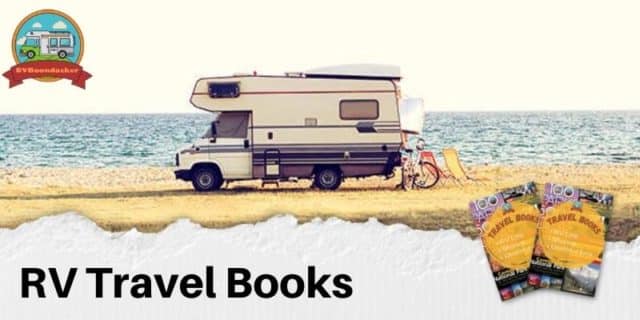
Camping by the beach is a unique experience. But, the boondocking on a beach is a hundred times better. Whether you are camping on the Florida beach or any beach of your choice, boondocking is the way to go. However, for first-timers, the experience can be very confusing. Is RV boondocking on the beach safe? Do you have to pay to spend the night by the beach? Do you get a proper parking spot? Are there any rules or regulations you need to adhere to? These and many more questions can pop up in your mind. The best way to go about it is to get some informative RV travel books.
Now that we are on this topic, let us decode these questions.
Things To Check For When Boondocking On The Beach
1. Tides:
A major problem that can ail beach boondockers is the occurrence of tides. This is an important aspect of safe boondocking with your RV. You need to keep in mind your safety and track the tides. It could be a potential safety risk when you park your RV on the beach sand. This is especially true as the water level rises. We aren’t talking about a river or pond that might not affect your RV. Rather, we are talking about the endless seas and oceans.
A big tidal wave and you might float away in the water. Depending on the height of the tide, the RV could float away, or the sand might wash away from beneath the tires. If the latter happens, you might get stuck in a difficult situation to recover from. Some good-quality RV books can help you understand the safety needs when boondocking on the beach.
Tides happen due to an intense orbital relationship between the moon, the sun, and the Earth. In most cases, a tide is experienced during the full moon or no moon days. However, an accurate prediction all on your own is almost impossible. So, you can seek the help of online applications that help you track the same.
You can also look for any advice in RV travel books. Finally, you can also inquire about the local safety guards to ensure no oncoming tide. Coast guards do not allow RV boondocking during high tides in most cases. So, you might notice certain signboards up all over the beach to help warn you. If there aren’t any signs, make sure you follow safety protocol. Then, call up or visit the local authorities to confirm that it is safe to park your RV on the beach.
2. Fees:
Another aspect that you need to keep in mind is the fees to set up the rig on the beach. You also keep in mind any registration requirements. Yes, boondocking is way cheaper when compared to RV parks. However, in most cases, it isn’t always free. There is a charge involved. If a place requires you to pay fees or register for the same, you should do it without fail.
For example, if the registration fee for a particular location is $10, you need to register at the soonest. Post-registration, you will get an RV sticker to confirm the registration. When you don’t have this sticker, you can be fined. Worst yet, you might have to leave the beach in the middle of the night. So, it is better that you opt for a bit of research before moving into the area.
Some good RV travel books can help you and give you some quality information. In some cases, the registration can be valid for a long time, even for an entire year.
3. Beware of the Sand:
When you plan on boondocking at the beach, beware of the sand. This sand is surely going to be everywhere inside your RV. However, you can practice some tips that can help keep the sand under control. In addition, you can seek some ideas from RV books.
You can lay out some towels or old clothing at the top and base of the RV’s steps. This will help reduce the amount of sand that gets into the RV. However, regardless of how hard you try, the sand will always make its way through into the RV. So, be prepared for a cleaning session after your beach boondocking experience.
But don’t let this ruin the fun for you. Enjoy your stay and make great memories.
What Should You Bring When Boondocking At The Beach?
Once you are aware of things to keep in mind, let us check out what you need to bring along. What can help you when boondocking on your favorite beach. First, bring a portable grill but ensure it is allowed in the area. Nothing compares to the feeling of kicking back & firing up your food as the waves come crashing by.
Plus, grilling & using recyclable paper plates will eliminate any need for dishes. Bring your fire pit if you wish to roast some smores as you watch the sunset by the beach. Of course, it would help if you also had all the necessary things that one carries on a normal beach day.
Moreover, being so close to the water can bring the temperature down as the day passes by. Either get some warm clothes or bring a small propane heater for that extra heat.
Do You Need Power Supply?
You don’t require a generator or solar power when boondocking for some days. You can get up as the sun rises & sit close to the fire by night. You can get some small inflatable lights powered by solar energy. They are perfect for navigating through the RV rig as it gets dark. You can also place one in your bathroom.
One important thing is to stay connected with your folks or close ones. This is especially true if you are boondocking by yourself. A solar-powered charger for your cellphone can be a great asset. It would help if you also kept some RV travel books nearby to help you whenever needed.
Yes, it is important to disconnect when boondocking. However, keep your friends and loved ones informed if any emergency arises. Meanwhile, relish the peaceful and stress-free environment as you watch the waves and enjoy nature.
Remember that there aren’t several beaches that allow RV boondocking. But, for those who do, the experience can be very rewarding.
General Tips For Beach Boondocking
Apart from going through the RV books, you can check out these general tips for beach boondocking.
- Detach the tow vehicle before driving on towards the sand
- Drive or walk around the tow vehicle to check the location
- Doing this will help you ensure that the sand isn’t too loose, causing you to get stuck
- If there is a fear of high tide, park your RV way back
- Be careful during the windy days
- Strong winds can blow the sand towards the RV & its tires, so you might get stuck
- Do not drive in locations with very loose sand unless necessary
- Be close to the seawater as the sand in this area is compact and wet (Unless its high tide)
- Carry extra water that can be poured on the sand to ensure you can drive to certain sections
Tips To Boondock Safely On A Beach
To ensure that you are safe the entire time you are on the beach with your RV, it is important to go through these tips.
1. Survey The Area:
Typically, before entering the sand, one must unhook the towing vehicle. Once you unhook the RV, survey the entire area to assess whether it is ideal for boondocking. First, test with your tow vehicle to determine if the sand isn’t too loose.
Check out if you can safely drive your RV in and out. Ensure that the RV can drive properly on the beach sand. There are several beaches where one might have to scale a sand dune to reach the beach area. Depending on the rig, you might have to ensure that the RV isn’t high-centered. Check for soft dunes, sand, washout areas, hills, and water.
This seems obvious, but it is important to keep this in mind. Even the most experienced SUV and truck drivers might make this mistake. This can also be confirmed when you read RV travel books.
Another thing to remember is that the sand can be soft or hard. So, while one beach has soft sand, the other has a hard one resembling the dirt roads. However, some beaches might have both. So, keep this in mind. When the beach sand resembles a dirt road, you can drive as you want.
On the other hand, for soft sand, you need to be slow yet smooth. Do not hit your brake, accelerate, or move way too fast. The key is to avoid the tires going deep into the beach sand.
2. Select Your Campsite:
Additionally, with the help of some RV Books, you can choose a suitable campsite. Of course, you would want to be right in front of the crashing waves. But, it would help if you also kept in mind the safety factor to sleep by the beach without stress.
Make sure you take into account the tide and plan accordingly. For example, you wouldn’t want to shift your camp late at night when the tide rises.
3. Always Have The Necessary Equipment:
When boondocking with your RV on the beach, you need to be ready for any issue. In addition, you need to build confidence to escape from any sticky situation. Therefore, it is important to be prepared with the right equipment.
You can keep some equipment with you like:
- Tire Inflators
- Shovel
- Tow Straps
- Wood Boards
- Tire Deflator
Also, make sure you consult some RV books for more information.
4. Put Away Your Furniture & Awning At Night:
When boondocking with an RV at the beach, the weather can change rapidly overnight. You wouldn’t want to look for your furniture all over the beach. So, it is important to put away any furniture or awning before the night arrives.
5. Conserve Water:
Even when you are boondocking by a vast water body, you surely cannot drink it. So, you must keep track of your water usage. The key is to invest in sustainable methods that include:
- Investing in good-quality composting toilets
- Flush with dishwater
- Change how you take bathe with wet wipes & dry shampoo
Is BoonDocking By The Beach Legal?
The legalities can vary for boondocking on the beach, depending on where you are. You cannot necessarily park your RV wherever and whenever you want. However, it is legal. The only thing you need to do is follow the etiquette and local rules set by the authorities.
If it requires paying a fee, do so and follow protocol.
Conclusion
You can safely boondock at your favorite beach with these tips in mind. Some thorough RV books can help you out. Ensure that you clean up behind you and do not trash the beach. Most of all, be prepared for any possible emergencies when boondocking in your RV.
Call to Action
Are you planning a trip to the beach with your RV? RV Boondocker is your best guide to help you enjoy your trip while being safe. You can check out the guide for newbies, RV travel, and even tap into the accessory requirements. To get in touch with us, you can visit our contact us page or sign up for our newsletter to get a quick guide delivered to your mail.

